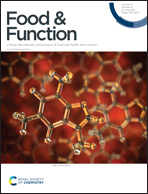Hydroxytyrosol alleviates oxidative stress and neuroinflammation and enhances hippocampal neurotrophic signaling to improve stress-induced depressive behaviors in mice
Abstract
Hydroxytyrosol (HT), the main phenolic compound in olives and olive products, has antioxidative, anti-inflammatory, neuroprotective, and other physiological functions. The effects of HT on depression are unclear. The aim of this study was to explore the effects of HT on chronic unpredictable mild stress (CUMS) induced depressive-like behaviors. Mice were exposed to CUMS for 9 weeks and then treated with HT beginning in the second week and continuing for 7 weeks. Behavioral, biochemical, and molecular tests were conducted at the end of the experiment. The sucrose preference was significantly decreased in the CUMS group versus the healthy control group. Also, immobility times in forced swimming and tail suspension tests were increased in CUMS-induced mice, but treatment with HT significantly reversed this change. HT ameliorated oxidative stress in CUMS-exposed mice by enhancing superoxide dismutase activity and reducing reactive oxygen species and malondialdehyde levels in the hippocampus. HT administration significantly suppressed microglia activation and inhibited the expression of tumor necrosis factor alpha and interleukin 1 beta in the hippocampus versus the untreated group. The expression level of glial fibrillary acidic protein (GFAP) and the number of GFAP-immunoreactive astrocytes in the hippocampus were significantly augmented by HT. Furthermore, HT treatment increased the expression of hippocampal brain-derived neurotrophic factor (BDNF), phosphorylated tropomyosin receptor kinase B (p-TrkB), and phosphorylated c-AMP response element binding protein (p-CREB) compared with the untreated CUMS group. Overall, HT improved CUMS-induced depressive-like behaviors in mice by alleviating oxidative stress and neuroinflammation and by enhancing the BDNF/TrkB/CREB signaling pathway.



 Please wait while we load your content...
Please wait while we load your content...